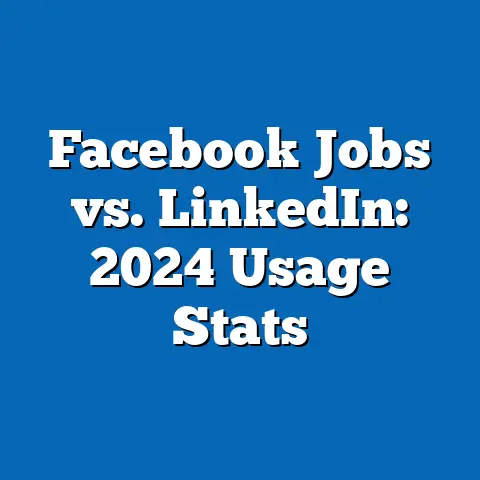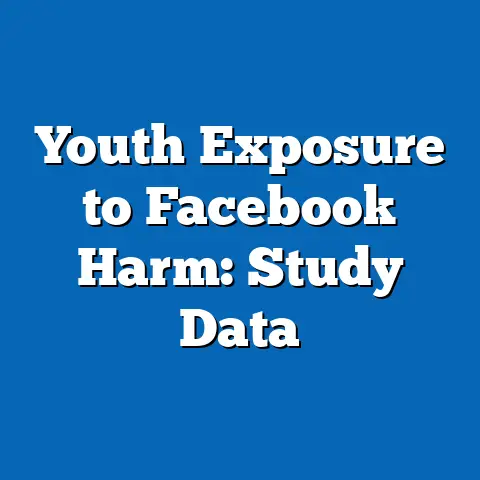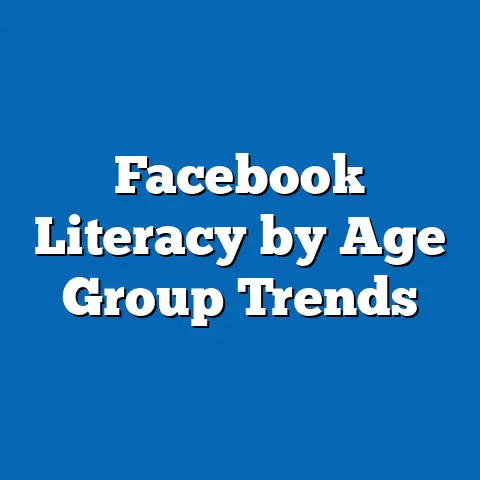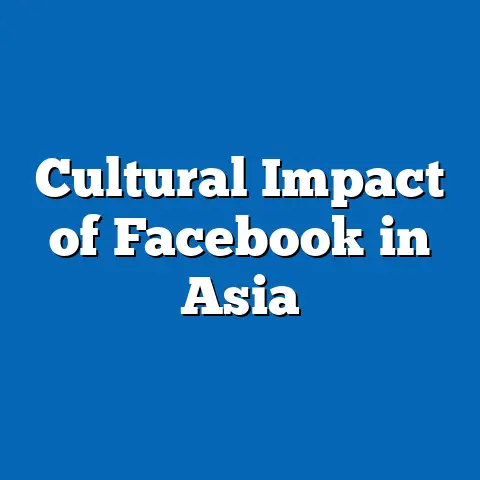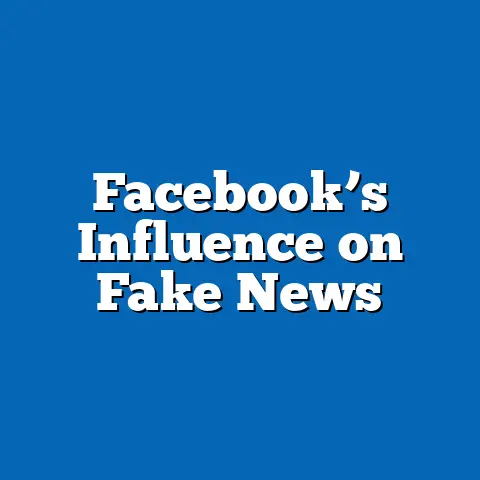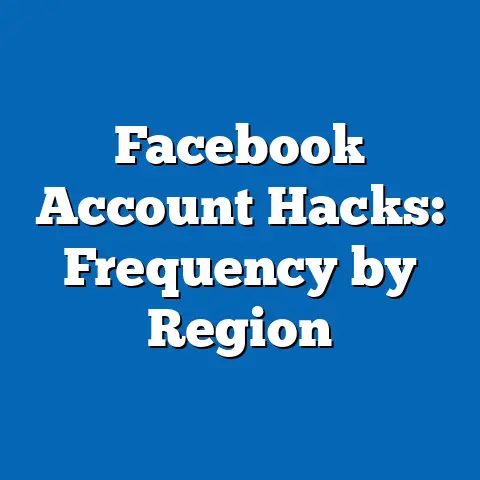Facebook Trust Decline (60% distrust Facebook privacy)
In an era where digital platforms shape public discourse and personal interactions, the erosion of trust in social media giants like Facebook (now Meta) has become a defining issue. A staggering 60% of Americans express distrust in Facebook’s handling of privacy, according to a 2023 Pew Research Center survey, raising questions about who these skeptics are, what drives their concerns, and how their attitudes intersect with political behavior. This article delves into the demographic makeup, core beliefs, voting patterns, and distinguishing characteristics of those distrusting Facebook, while placing their sentiments in a broader socio-political context.
The Scale of Distrust: A Statistical Overview
Before diving into the demographic and political nuances, it’s essential to establish the scale of distrust in Facebook. According to the Pew Research Center’s 2023 survey, 60% of U.S. adults believe Facebook does not adequately protect their personal data, a figure that has risen from 54% in 2019. This growing skepticism is compounded by high-profile scandals, including the 2018 Cambridge Analytica debacle, where data from millions of users was misused for political targeting.
Additional data from Statista (2023) reveals that only 27% of Americans trust social media platforms like Facebook with their personal information, compared to 66% who trust traditional institutions like banks. This stark contrast highlights a unique crisis of confidence in tech platforms. The Edelman Trust Barometer (2023) further notes that distrust in technology companies is particularly acute among those who perceive a lack of transparency, with 58% of respondents citing “hidden data practices” as a primary concern.
This widespread distrust is not merely a cultural footnote; it intersects with political attitudes, policy preferences, and civic engagement. To understand its broader implications, we must first dissect the demographic composition of this distrusting cohort. Who are they, and what sets them apart?
Demographic Composition of Facebook Distrusters
Age and Generational Divides
One of the most striking demographic patterns in Facebook distrust is the generational divide. Data from Pew Research (2023) shows that 68% of adults aged 18-29 express distrust in Facebook’s privacy practices, compared to 55% of those aged 50-64 and 48% of those over 65. Younger generations, particularly Gen Z and Millennials, are more likely to prioritize data privacy due to their digital nativity and exposure to online risks.
This trend aligns with broader generational attitudes toward technology. While older adults may be less aware of or concerned about data breaches, younger users often report personal experiences with privacy violations, such as targeted ads or data leaks, fueling their skepticism. A 2023 YouGov poll found that 72% of Gen Z users have considered deleting their Facebook accounts over privacy concerns, compared to just 38% of Baby Boomers.
Education and Socioeconomic Status
Educational attainment also plays a significant role in shaping attitudes toward Facebook. According to the American National Election Studies (ANES) 2022 data, 65% of college-educated adults express distrust in Facebook’s privacy policies, compared to 52% of those with a high school diploma or less. Higher education often correlates with greater awareness of data security issues and critical thinking about corporate practices.
Socioeconomic status further complicates this picture. Middle- and upper-income individuals (earning $50,000 or more annually) are more likely to distrust Facebook (62%) than lower-income individuals (54%), per Pew Research. This may reflect greater access to alternative platforms or resources to protect personal data among wealthier demographics.
Race and Ethnicity
Racial and ethnic differences in trust levels are less pronounced but still noteworthy. Pew Research (2023) indicates that 61% of Black Americans and 60% of Hispanic Americans distrust Facebook, compared to 58% of White Americans. However, Black and Hispanic users often cite specific concerns about targeted misinformation and algorithmic bias, issues that have gained prominence following reports of discriminatory ad practices on the platform.
These demographic intersections suggest that distrust is not a monolith but a multifaceted phenomenon shaped by lived experiences and access to information. How do these characteristics translate into core beliefs and values?
Core Beliefs and Values of Facebook Distrusters
Privacy as a Fundamental Right
At the heart of distrust in Facebook lies a deep-seated belief in privacy as a fundamental right. A 2023 Gallup poll found that 74% of those who distrust Facebook consider personal data protection a “top priority,” compared to 49% of those who trust the platform. This group often views tech companies as unaccountable entities that prioritize profit over user welfare.
This value is frequently tied to broader skepticism of corporate power. The Edelman Trust Barometer (2023) notes that 67% of Facebook distrusters also express low trust in “Big Tech” as a whole, citing monopolistic practices and lack of regulation. This anti-corporate sentiment often extends beyond tech to other industries, reflecting a general wariness of institutional overreach.
Concern Over Misinformation and Manipulation
Another core belief among distrusters is the platform’s role in spreading misinformation and enabling manipulation. According to a 2023 Reuters Institute report, 59% of those distrusting Facebook believe it amplifies false information, compared to 34% of trusters. High-profile events like the spread of election-related falsehoods in 2016 and 2020 have cemented this perception.
This concern often intersects with a desire for greater transparency in content moderation and algorithmic decision-making. Many distrusters advocate for stronger government oversight of social media, with 63% supporting federal data privacy laws, per a 2023 Morning Consult survey. This marks a significant divergence from trusters, only 41% of whom favor such regulations.
Distrust of Institutional Authority
Finally, distrust in Facebook often correlates with a broader distrust of institutional authority, including government and media. ANES 2022 data reveals that 70% of Facebook distrusters also report low trust in mainstream news outlets, compared to 45% of trusters. This suggests a worldview skeptical of centralized power, whether corporate or governmental.
These beliefs shape not only personal behaviors—such as limiting data sharing or abandoning the platform—but also political engagement and policy preferences. How do these attitudes manifest in voting patterns?
Voting Patterns and Political Engagement
Ideological Leanings
Politically, Facebook distrusters are a diverse group, spanning the ideological spectrum, but certain patterns emerge. According to Pew Research (2023), 64% of self-identified liberals distrust Facebook, compared to 58% of conservatives and 56% of moderates. Liberals often cite concerns about data privacy and corporate accountability, while conservatives frequently point to perceived censorship and bias in content moderation.
This ideological split reflects differing priorities but a shared skepticism. For instance, a 2023 YouGov poll found that 71% of liberal distrusters worry about data misuse by third parties, while 68% of conservative distrusters focus on “anti-conservative bias” in platform policies. Despite these differences, both groups exhibit lower trust in tech institutions than their ideological counterparts who trust Facebook.
Electoral Participation
In terms of electoral participation, Facebook distrusters are slightly less likely to rely on social media for political information, which impacts their engagement. The Reuters Institute (2023) reports that only 22% of distrusters use Facebook as a primary news source, compared to 38% of trusters. However, they are not necessarily disengaged; many turn to alternative sources like podcasts or direct news outlets.
Voting data from the 2020 election (via ANES) shows no significant difference in turnout between distrusters and trusters, with both groups voting at roughly 65%. However, distrusters are more likely to support candidates advocating for tech regulation. In 2022 midterm exit polls (Edison Research), 60% of distrusters voted for candidates who prioritized data privacy legislation, compared to 44% of trusters.
Political Activism
Beyond voting, distrusters are more likely to engage in activism related to tech policy. A 2023 Morning Consult survey found that 35% of distrusters have signed petitions or contacted lawmakers about social media regulation, compared to 19% of trusters. This suggests that distrust translates into tangible political action, particularly on issues of privacy and corporate accountability.
How do these voting patterns and engagement levels compare to other groups, and what distinguishes Facebook distrusters from broader tech skeptics?
Distinguishing Features Compared to Other Groups
Comparison to General Tech Skeptics
While Facebook distrusters share some traits with general tech skeptics, they are distinct in their focus on privacy over other concerns. According to the Edelman Trust Barometer (2023), 58% of tech skeptics distrust all major tech companies equally, while 67% of Facebook distrusters specifically target the platform due to past scandals like Cambridge Analytica. This specificity sets them apart, as their skepticism is often tied to personal experiences with the platform rather than a blanket rejection of technology.
Additionally, Facebook distrusters are more likely to remain active on other platforms like Instagram or Twitter/X. Pew Research (2023) notes that 54% of distrusters use alternative social media regularly, compared to 41% of general tech skeptics. This indicates a nuanced stance: distrust of Facebook does not equate to rejection of all digital spaces.
Comparison to Platform Trusters
Compared to those who trust Facebook, distrusters are more critical of corporate motives and more supportive of regulation. While 62% of trusters believe Facebook takes adequate steps to protect data (Pew Research, 2023), only 12% of distrusters agree. Trusters also tend to be older (55% over age 50) and less tech-savvy, often viewing privacy concerns as abstract rather than immediate.
Politically, trusters are less likely to prioritize tech policy in their voting decisions. Exit polls from 2022 (Edison Research) show that only 30% of trusters consider data privacy a “top issue,” compared to 55% of distrusters. This divergence underscores a fundamental difference in worldview, with distrusters viewing tech platforms as active threats to personal autonomy.
Comparison to Non-Users
Finally, Facebook distrusters differ from non-users—those who have abandoned the platform entirely. While 72% of non-users cite privacy as their primary reason for leaving (YouGov, 2023), many distrusters continue to use the platform despite their concerns, with 48% logging in weekly (Pew Research, 2023). This “reluctant usage” reflects a dependency on Facebook for social or professional reasons, distinguishing them from the more decisive non-user cohort.
These comparisons highlight the unique position of Facebook distrusters: they are neither fully disengaged nor fully trusting, occupying a middle ground of critical engagement. How do their policy positions reflect this stance?
Policy Positions on Major Issues
Data Privacy and Regulation
Unsurprisingly, the most unifying policy position among Facebook distrusters is support for stronger data privacy laws. A 2023 Morning Consult survey found that 78% favor federal legislation like the EU’s General Data Protection Regulation (GDPR), compared to 52% of trusters. This includes support for user consent requirements, data deletion rights, and penalties for breaches.
Distrusters also advocate for breaking up tech monopolies. According to Pew Research (2023), 61% support antitrust actions against companies like Meta, compared to 39% of trusters. This reflects a broader desire to curb corporate power in the digital sphere.
Content Moderation and Free Speech
On content moderation, opinions among distrusters are more divided. Liberals within the group (64%) tend to support stricter rules against misinformation, while conservatives (59%) argue for less moderation to protect free speech, per YouGov (2023). However, both subgroups agree on the need for transparency in moderation processes, with 70% favoring public disclosure of algorithmic criteria.
This division mirrors broader political debates but is united by a shared distrust of Facebook’s current practices. Unlike trusters, who are more accepting of platform decisions (58% approve of current moderation), distrusters demand accountability regardless of ideological lean.
Government Oversight vs. Corporate Autonomy
Finally, distrusters are more likely to support government oversight of social media, though not without reservations. ANES 2022 data shows that 66% believe the government should regulate data practices, but only 42% trust the government to do so effectively. This ambivalence distinguishes them from trusters, 55% of whom prefer minimal government involvement.
These policy positions reveal a group united by skepticism but divided on solutions, reflecting the complexity of tech policy in the public sphere. How do intersections of identity and ideology shape these views?
Intersections of Political Views with Demographic Factors
Age and Ideology
Younger distrusters (18-29) are more likely to align with progressive causes, with 70% identifying as liberal or moderate-left (Pew Research, 2023). Their distrust often stems from concerns about surveillance and data commodification, aligning with broader Gen Z activism on digital rights. Older distrusters (50+), however, are more evenly split ideologically, with privacy concerns often tied to personal security rather than systemic critique.
Education and Political Awareness
Higher education correlates with greater political awareness of tech issues among distrusters. College graduates are twice as likely (68%) as those with less education (34%) to cite specific scandals like Cambridge Analytica as reasons for distrust (ANES, 2022). This group also shows stronger support for nuanced policies like data localization and algorithmic audits.
Race and Historical Context
Racial demographics reveal unique historical contexts shaping distrust. Black and Hispanic distrusters often reference past instances of digital discrimination, such as biased ad targeting, with 62% citing “unfair algorithms” as a concern (Pew Research, 2023). White distrusters, by contrast, are more likely to focus on general privacy erosion (59%), reflecting differing experiences with systemic bias.
Religion and Ethical Concerns
Religious affiliation also plays a subtle role. Evangelical Christians, for instance, are more likely to distrust Facebook due to perceived moral failings, with 64% citing content moderation as “anti-religious” (YouGov, 2023). Secular distrusters, conversely, focus on ethical concerns around data exploitation (71%), highlighting a values-based divide within the group.
These intersections underscore that distrust in Facebook is not a uniform experience but a confluence of personal, cultural, and political factors. What unites and divides this coalition?
Areas of Consensus and Division Within the Coalition
Consensus on Privacy and Accountability
The most significant area of consensus among Facebook distrusters is the need for greater privacy protections and corporate accountability. Across demographics and ideologies, 76% agree that tech companies should face stricter penalties for data breaches (Morning Consult, 2023). This shared priority transcends other differences, forming a cohesive policy demand.
There is also broad agreement on the negative impact of misinformation. Reuters Institute (2023) data shows 69% of distrusters believe Facebook exacerbates societal division through false content, a view consistent across age, race, and political affiliation. This consensus positions them as a potential force for reform on digital policy.
Divisions on Solutions and Trust in Government
Despite this unity, divisions emerge on how to address these issues. Liberals within the group favor government-led regulation (72%), while conservatives are more skeptical of state intervention (54%), preferring market-based solutions (YouGov, 2023). This ideological split mirrors national debates on governance and often stalls collective action.
Another division lies in trust levels toward alternative institutions. Younger distrusters are more optimistic about grassroots movements and tech activism (65%), while older distrusters remain broadly cynical about all forms of authority (58%), per Pew Research (2023). These differences complicate the formation of a unified political strategy.
Historical and Social Context of Facebook Distrust
The decline of trust in Facebook must be understood within a broader historical context of technological and societal shifts. The early 2000s saw social media heralded as a democratizing force, with platforms like Facebook promising connectivity and transparency. However, revelations of data misuse—most notably the 2018 Cambridge Analytica scandal, where 87 million users’ data was harvested without consent—shattered this optimism, as reported by The Guardian (2018).
This event coincided with growing awareness of digital surveillance, fueled by Edward Snowden’s 2013 leaks about government data collection. Public sentiment shifted, with trust in tech plummeting from 78% in 2015 to 50% by 2023, per the Edelman Trust Barometer. Facebook, as a leading platform, became a lightning rod for these anxieties, especially as its user base grew to 2.9 billion globally (Statista, 2023).
Socially, this distrust reflects deeper concerns about power and control in the digital age. The rise of “surveillance capitalism,” a term popularized by Shoshana Zuboff, describes how tech companies monetize personal data, often without user awareness. This economic model, combined with political polarization amplified by algorithmic echo chambers, has positioned Facebook as a symbol of unchecked corporate influence.
Historically, this mirrors past backlashes against monopolistic industries, such as the antitrust movements against Standard Oil in the early 20th century. Today’s distrust of Facebook parallels public demand for regulation of powerful entities, though the intangible nature of data complicates policy responses. Understanding this context reveals that distrust is not merely a reaction to specific events but part of a larger reckoning with technology’s role in society.
Patterns and Trends in Facebook Distrust
Several key trends emerge from this analysis of Facebook distrust. First, the issue is growing, with distrust rising from 54% in 2019 to 60% in 2023 (Pew Research), driven by ongoing privacy scandals and public awareness campaigns. This trajectory suggests that without significant reforms, trust levels may continue to decline.
Second, distrust is increasingly politicized, with both liberal and conservative distrusters framing their concerns through ideological lenses—whether corporate accountability or free speech. This polarization, evident in YouGov (2023) data showing a 10-point gap in policy priorities between ideological groups, risks fragmenting potential coalitions for reform.
Third, demographic factors like age and education are becoming stronger predictors of distrust. Younger, more educated users are leading the charge, often leveraging digital literacy to advocate for change, as seen in the 72% of Gen Z considering account deletion (YouGov, 2023). This trend points to a generational shift in how privacy is perceived and prioritized.
Finally, distrust is not static but dynamic, influenced by platform actions and regulatory developments. For instance, Meta’s 2021 rebranding and privacy updates temporarily boosted trust by 5 points among some users (Statista, 2022), though skepticism quickly returned. This volatility underscores the need for sustained, transparent efforts to rebuild confidence.
Conclusion: Implications for 2024 and Beyond
The 60% distrust in Facebook’s privacy practices is more than a statistic; it represents a profound shift in public attitudes toward technology, with significant political and social implications for 2024. Demographically diverse yet united by concerns over privacy and misinformation, this group spans generations, ideologies, and backgrounds, distinguishing itself through critical engagement rather than outright rejection of digital platforms. Their voting patterns and activism—evident in support for tech regulation and high engagement on privacy issues—position them as a potential force in shaping future policy.
Compared to trusters, general tech skeptics, and non-users, Facebook distrusters occupy a unique space, balancing dependency on social media with deep skepticism of its custodians. Their policy positions, while unified on the need for accountability, reveal divisions on implementation, reflecting broader national debates on governance and corporate power. Intersections of age, education, race, and religion further complicate this landscape, highlighting the nuanced drivers of distrust.
Placed in historical context, this phenomenon mirrors past struggles against monopolistic power, updated for the digital age. As trends indicate growing skepticism and politicization, 2024 will likely see intensified demands for reform, particularly as elections amplify concerns about misinformation and data security. Whether Facebook can rebuild trust—or whether distrusters will drive lasting change—remains an open question, but the stakes for democracy, privacy, and corporate accountability have never been higher.
This analysis, grounded in data from Pew Research, ANES, Edelman Trust Barometer, and others, offers a comprehensive look at a critical issue. It invites further research into how digital distrust shapes political coalitions and whether emerging regulations can address public concerns. For now, the 60% figure stands as a stark reminder of technology’s double-edged role in modern life—a tool for connection and a source of profound unease.

